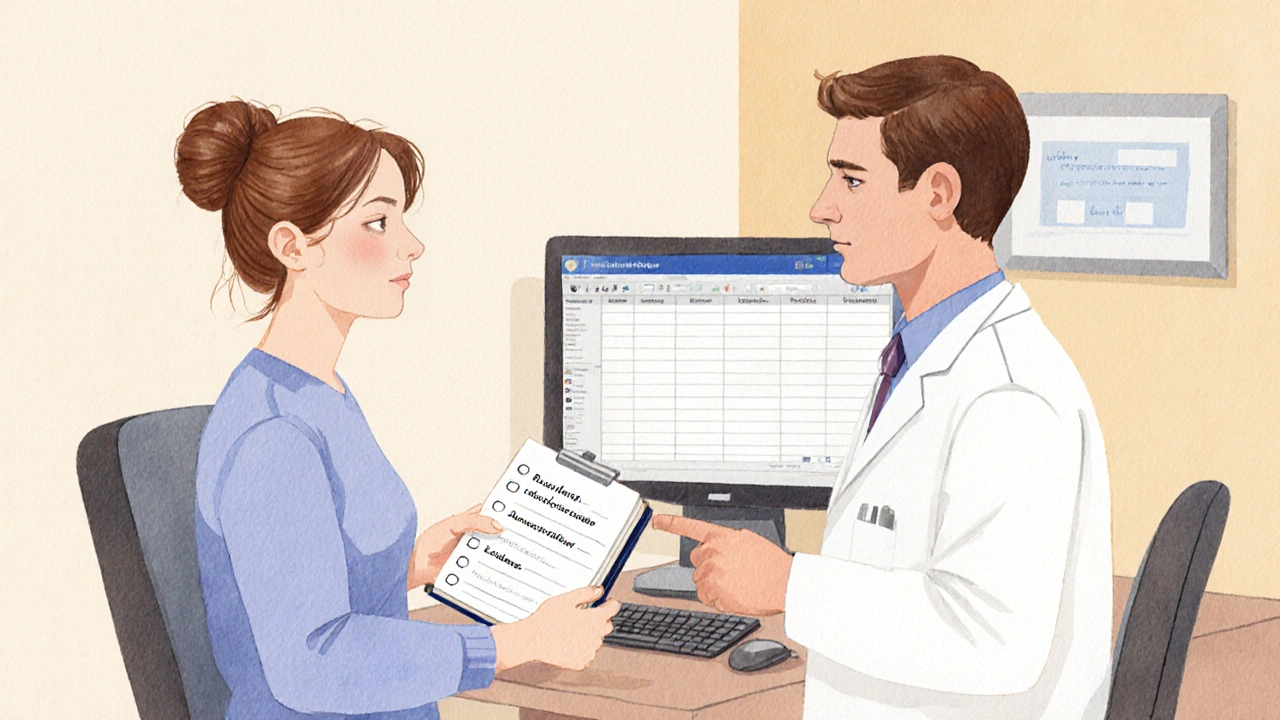Flatulence Symptom Checker
Dietary Triggers
How often do you eat foods known to cause gas?
Medications
Do you take any medications that might cause gas?
Stress Level
How would you rate your current stress level?
Symptom Duration
How long have you been experiencing these symptoms?
Your Analysis Results
Common Triggers for Gas and Bloating
Symptoms: Bloating, gas, normal stool
Symptoms: Gas, cramping, watery stool
Symptoms: Gas, abdominal pain, alternating constipation/diarrhea
Symptoms: Gas, bloating, nutrient malabsorption
Symptoms: Gas, nausea, altered stool
Key Takeaways
- Preparing a symptom diary makes the conversation clear and factual.
- Use neutral, medical‑friendly language to reduce embarrassment.
- Ask specific questions about diet, testing, and treatment options.
- Know common causes-diet, lactose intolerance, IBS, medication-and how they differ.
- Follow up with a clear plan and know when to seek a second opinion.
When you sit down with your clinician, you want the talk to be productive, not awkward. Flatulence is the release of gas from the gastrointestinal tract, often accompanied by bloating, rumbling, or discomfort. Bringing it up isn’t a luxury; it can signal underlying conditions that need attention. This guide shows you how to frame the issue, what details to share, and which questions to ask so you leave the appointment with a clear next step.
Why Bring Up Flatulence with Your Doctor?
Most people think a little gas is harmless, but persistent or painful episodes can point to dietary intolerances, infections, or chronic disorders like irritable bowel syndrome (IBS). Ignoring the symptom may delay diagnosis, prolong discomfort, and even affect mental health-embarrassment can lead to social withdrawal. A doctor can rule out serious causes, suggest dietary tweaks, or order tests such as a breath test for lactose intolerance or a stool analysis.
Step 1: Prepare Before the Appointment
Preparation turns a vague complaint into concrete data. Follow these three actions:
- Start a symptom diary. Record the time, intensity (scale 1‑10), foods eaten, and any related feelings-bloating, pain, urgency. Apps or a simple notebook work.
- Note medication and supplement use. Some antibiotics, fiber pills, or probiotics alter gut gas production.
- Track lifestyle factors: stress, sleep, and exercise. Stress triggers the gastrointestinal tract's motility, which can heighten gas.
Having at least a week of entries shows patterns and gives the doctor a starting point.

Step 2: Choose Neutral, Medical‑Friendly Language
Words matter. Instead of saying, “I’m embarrassed about my ‘farting,’” try phrases like:
- “I experience frequent abdominal bloating and gas.”
- “I have episodes of excessive flatulence that sometimes cause discomfort.”
- “My digestive system feels distended after meals.”
These terms keep the conversation clinical, reduce stigma, and signal you’re looking for a solution, not just venting.
Step 3: Share the Essentials During the Visit
When the doctor asks about your concerns, hit these five points:
- Symptom pattern. "I notice gas 3‑4 times a day, especially after dairy or beans. The intensity is usually a 6/10 and lasts up to two hours."
- Associated symptoms. Mention any pain, changes in stool frequency, weight loss, or nausea.
- Dietary triggers. List foods you suspect-e.g., lactose, cruciferous veggies, carbonated drinks.
- Medication & supplements. Include recent antibiotics, iron pills, or fiber boosters.
- Impact on life. Explain how the issue affects work, social events, or sleep.
Step 4: Ask Targeted Questions
Good questions guide the doctor toward the right tests and advice. Keep a printed list so you don’t forget:
- “What could be causing my frequent gas? Could it be a food intolerance?”
- “Do I need any tests, such as a breath test for lactose or a stool analysis?”
- “Would a low‑FODMAP diet help, and how should I start it safely?”
- “Are there specific probiotics or over‑the‑counter options you recommend?”
- “When should I come back for a follow‑up, and what signs mean I need urgent care?”

Common Causes - Quick Comparison
| Cause | Typical Foods/Triggers | Key Symptoms | First‑line Test |
|---|---|---|---|
| Dietary fiber overload | Beans, lentils, whole grains | Bloating, gas, normal stool | Diet review |
| Lactose intolerance | Dairy, soft cheeses | Gas, cramping, watery stool | Lactose breath test |
| Irritable bowel syndrome (IBS) | Varied, stress‑related | Gas, abdominal pain, alternating constipation/diarrhea | Rome IV criteria, exclusion of other disease |
| Small intestinal bacterial overgrowth (SIBO) | High‑sugar diets, antibiotics | Gas, bloating, nutrient malabsorption | Hydrogen breath test |
| Medication side‑effects | Antibiotics, metformin, iron supplements | Gas, nausea, altered stool | Medication review |
Step 5: Follow‑Up and Next Actions
After the appointment, you’ll likely have a plan. Keep these steps in mind:
- Implement dietary changes. If the doctor suggests a low‑FODMAP trial, start with a 2‑week elimination phase and note changes.
- Schedule recommended tests within the timeframe given-most labs turn around results in 1‑2 weeks.
- Update your symptom diary with any new patterns; bring it to the follow‑up visit.
- If symptoms persist despite adherence, discuss referral to a gastroenterologist or a dietitian.
- Know red‑flag signs-weight loss, blood in stool, severe pain-that warrant immediate medical attention.
Remember, tackling flatulence is a partnership. Your openness and data help the clinician pinpoint the cause faster.
Mini FAQ
Is it normal to feel embarrassed about flatulence?
Yes, many people feel self‑conscious, but doctors see digestive complaints daily. Framing the issue with clinical terms removes stigma and speeds up diagnosis.
When should I request a test for lactose intolerance?
If you notice gas, bloating, or diarrhoea within 30‑120 minutes after dairy, ask for a hydrogen breath test. The doctor may also try an elimination diet first.
Can probiotics help reduce gas?
Certain strains like Bifidobacterium infantis have shown benefit for IBS‑related gas. Discuss dosage and brand with your doctor.
What lifestyle changes can I make right now?
Eat smaller meals, chew slowly, limit carbonated drinks, and incorporate gentle movement after meals. Stress‑reduction techniques-deep breathing or yoga-also calm the gut.
How often should I follow up with my doctor?
If initial changes don’t improve symptoms within 4‑6 weeks, schedule a review. Faster follow‑up is needed if you develop weight loss, blood, or severe pain.
Armed with a clear diary, neutral language, and a short list of questions, you can talk to doctor about flatulence without blushing. The goal is a healthier gut and a confident, informed conversation that leads to relief.

Keeping a simple symptom diary is a game‑changer – jot down what you ate, when the bloating hits, and how intense it feels, and you’ll walk into the appointment armed with clear data.
Wow, you’re really going to tell your doc you ‘fart a lot’? 😂 Just hand them a one‑page cheat sheet and say, “I’m experiencing excessive gas after beans and carbonated drinks.” 🥤
When you suspect lactose intolerance, the classic sign is gas and cramping within an hour of dairy consumption; a hydrogen breath test confirms it with over 90% accuracy, so asking for that test is perfectly reasonable.
Start with a low‑FODMAP trial for two weeks – eliminate the high‑fructan veggies and see if the gas drops, then reintroduce one group at a time while tracking changes; that structured approach really impresses any clinician.
Don’t let embarrassment hold you back – a quick note like “I’m dealing with frequent abdominal bloating after meals, especially dairy and beans” makes the conversation clinical and painless. 🌱💬
Honestly, a one‑sentence diary entry is enough to get the point across.
Adding a column for stress level can reveal a hidden pattern; many people notice gas spikes on high‑stress days, so note that and bring it up – it shows you’ve thought about the whole picture.
Just a quick note: the correct medical term is “flatulence,” not “farting,” which might help keep the tone professional when you speak with the doctor. 👍
That diary tip is overused; doctors already know about it.
Also, a quick mention of any recent antibiotics can clue the clinician into possible SIBO.
In the U.S. it’s totally normal to bring up gut issues; doctors are trained for that, so no need to act like it’s a taboo.
Breath tests for hydrogen and methane are non‑invasive, give results in a few hours, and can differentiate between lactose intolerance and SIBO, making them a solid first step.
Stick to the plan you make with your doctor and track the results – consistency wins the day.
Imagine you’re a detective gathering clues: each bite of food, each episode of bloating, each flare‑up of gas becomes a piece of evidence.
First, write down the exact time you ate a meal and what was on your plate – beans, lentils, dairy, carbonated drinks – and note the latency until symptoms start.
Second, rate the intensity on a clear 1‑10 scale, because vague descriptors like “a lot” are ambiguous.
Third, capture accompanying signs: is there abdominal pain, changes in stool consistency, or nausea? These co‑symptoms narrow the differential diagnosis.
Fourth, mark any medications or supplements you’re taking; iron, metformin, antibiotics, and even high‑dose fiber pills are notorious gas producers.
Fifth, log lifestyle factors – stress level, sleep quality, physical activity after meals – as the gut–brain axis can amplify or dampen symptoms.
When you hand this structured log to your physician, you’re not merely “complaining” about flatulence; you’re presenting a concise clinical picture.
Doctors can then decide quickly whether to order a lactase breath test, a hydrogen/methane SIBO panel, or simply suggest a low‑FODMAP trial.
Moreover, having objective data empowers you to discuss treatment efficacy – did the low‑FODMAP diet reduce your gas score from 8 to 2?
Finally, keep the log after the visit; it becomes a baseline for any future adjustments or referrals to a gastroenterologist.
In short, a disciplined symptom diary transforms an uncomfortable topic into actionable medical information, paving the way for relief and better quality of life.
The advice is overly simplistic; real cases need more nuance.
This whole spiel is a waste of time – people should just quit eating beans and be done with it.